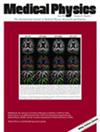High spatiotemporal-resolution abdominal 4D-MRI through respiratory-synchronized frame collaborative reconstruction
Abstract
Background
Four-dimensional magnetic resonance imaging (4D-MRI) holds great promise for precise abdominal radiotherapy guidance. However, current 4D-MRI methods are limited by an inherent trade-off between spatial and temporal resolutions, resulting in compromised image quality characterized by low spatial resolution and significant motion artifacts, hindering clinical implementation. Despite recent advancements, existing methods inadequately exploit redundant frame information and struggle to restore structural details from highly undersampled acquisitions.
Purpose
This study aims to develop a technique that leverages information across multiple frames to mitigate spatial undersampling, thereby enabling superior spatiotemporal resolution in abdominal 4D-MRI.
Methods
We introduce a novel reconstruction approach for 4D-MRI that leverages respiratory-synchronized frames to reconstruct target frames with enhanced image quality. Specifically, we introduce a multi-frame collaborative reconstruction network (MCR-Net) that capitalizes on inter-frame correlations and complementary information for faithful reconstruction. MCR-Net integrates two key mechanisms: the Inter-frame mutual-attention mechanism (IMM) and the structure-aware consolidation module (SaCM). IMM enhances feature extraction by exploiting correlations among neighboring respiratory-synchronized frames, thereby reinforcing shared anatomical features while suppressing random artifacts and noise. SaCM consolidates structural information across frames by leveraging context-aware residual learning, enhancing high-frequency details, and filtering irrelevant data during multi-frame fusion, thus significantly improving the clarity and anatomical integrity.
Results
Experimental evaluations on clinical patient datasets (training: n = 20; validation: n = 6) demonstrate that our method significantly outperforms nine state-of-the-art reconstruction approaches in both visual quality and quantitative accuracy. MCR-Net achieves superior performance in MAE, SSIM, and PSNR, outperforming the next-best methods by 3.77%, 1.03%, and 6.74%, respectively. Furthermore, our experiments validate that MCR-Net enhances registration accuracy compared to original low-quality 4D-MRI by 10.66%, 3.60%, and 1.94% in MAE, SSIM, and NCC metrics. Additionally, simulations demonstrate that MCR-Net effectively maintains high image quality even under significantly increased undersampling ratios.
Conclusion
Our findings demonstrate that MCR-Net effectively suppresses artifacts and recovers missing anatomical structures from undersampled acquisitions, underscoring its potential to enhance 4D-MRI's spatiotemporal resolution and advance clinical applications in abdominal radiotherapy.



 求助内容:
求助内容: 应助结果提醒方式:
应助结果提醒方式:


